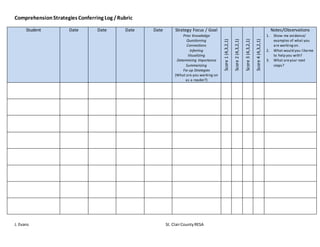
Comprehension strategies conferring log rubric
- 1. ComprehensionStrategiesConferring Log /Rubric J. Evans St. ClairCountyRESA Student Date Date Date Date Strategy Focus / Goal Prior Knowledge Questioning Connections Inferring Visualizing Determining Importance Summarizing Fix-up Strategies (What are you working on as a reader?) Score1(4,3,2,1) Score2(4,3,2,1) Score3(4,3,2,1) Score4(4,3,2,1) Notes/Observations 1. Show me evidence/ examples of what you are workingon. 2. What would you likeme to help you with? 3. What areyour next steps?
- 2. ComprehensionStrategiesConferring Log /Rubric J. Evans St. ClairCountyRESA Strategy 4 3 2 1 Prior Knowledge/ Connections Consistently activates relevant, prior knowledge (schema) before, during, andafter reading text. Proficient readers “useprior knowledge toevaluatethe adequacy ofthemodel of meaning they have developed”and tostorenewly learned information with other relatedmemories. Sometimes activates relevant,prior knowledge (schema) before, during, andafter reading text. Sometimes uses prior knowledgetoevaluate the adequacy ofthe model of meaning they have developed and tostorenewly learned information withotherrelated memories. Rarely activates relevant,prior knowledge (schema) before, during, andafter reading text. Rarely uses prior knowledge toevaluatethe adequacy ofthemodel of meaning they have developed andto storenewly learned information withotherrelated memories. Does not activate relevant, priorknowledge (schema) before, during, andafter reading text. Does not useprior knowledge toevaluatethe adequacy ofthemodel of meaning they have developed andto storenewly learned information withotherrelated memories. Questioning Consistently asks questions ofthemselves, theauthors, and the texts they read. Proficientreaders usetheirquestions to clarify and to focus theirreading. Sometimes asks questions ofthemselves,the authors, and the texts they read. Sometimes uses theirquestions toclarify and to focus their reading. Rarely asks questions ofthemselves, the authors, and the texts they read. Rarely uses their questions to clarify and to focus theirreading. Does not askquestions ofthemselves, the authors, and the texts they read. Do not use their questions toclarify and tofocus their reading. Inference Consistently draws inferences from text. Proficient readers usetheir prior knowledge(schema) and textual information todraw conclusions, makecritical judgments, andform unique interpretations from text. Inferences mayoccur intheform ofconclusions, predictions,or new ideas. Sometimes draws inferences fromtext. Sometimes uses their prior knowledge (schema) and textualinformation to draw conclusions, make criticaljudgments, and formunique interpretations from text. Inferences may sometimes occur in theform ofconclusions, predictions,or new ideas. Rarely draws inferences fromtext. Rarely uses theirprior knowledge (schema) and textualinformationto drawconclusions, make criticaljudgments, and formunique interpretations from text. Inferences rarelyoccur intheform of conclusions, predictions, ornewideas. Does not drawinferences from text. Does not use their prior knowledge (schema) andtextual information todraw conclusions, makecritical judgments, andform unique interpretations from text. Inferences donot occur intheform ofconclusions,predictions, or new ideas. Visualizing Consistently creates visualand other sensory images from text during and after reading. These images may includevisual, auditoryandother sensoryconnections to thetext. Proficient readers usetheseimages to deepen their understanding ofthetext. Sometimes creates visual andother sensory images fromtext during and after reading. These images mayincludevisual, auditory and other sensory connections tothetext. Sometimes uses theseimages to deepentheir understanding ofthetext. Rarely creates visualand othersensory images fromtext during and after reading. These images may includevisual, auditory and other sensoryconnections to thetext. Rarely uses theseimages to deepen their understanding ofthetext. Does not create visual and other sensory images from text during and after reading. These images mayincludevisual, auditory and other sensoryconnections to thetext. Does not use these images to deepen their understanding of the text. Determine Importance Consistently determines themostimportantideas and themes in a text. Proficientreaders usetheirconclusions about important ideas tofocus their reading andto exclude peripheral or unimportantdetails from memory. Sometimes determines themost important ideas andthemes in a text. Sometimes uses their conclusions about important ideas tofocus their reading andto excludeperipheral orunimportant details from memory. Rarely determines themostimportant ideas and themes in a text. Rarely uses theirconclusions aboutimportant ideas tofocus their reading and to exclude peripheral or unimportantdetails from memory. Does not determine the most importantideas and themes in a text. Does not usetheirconclusions aboutimportant ideas tofocus their reading and to exclude peripheral or unimportantdetails from memory. Synthesize Consistently retells or synthesizes whatthey haveread. Proficientreaders attend to the most important information orclarityofthe synthesis itself. Readers synthesizein order to betterunderstand what they have read. Sometimes retells or synthesizes what theyhave read. Sometimes attends tothemost important information orclarityofthe synthesis itself. Readers synthesize inorder tobetter understand whatthey haveread. Rarely retells orsynthesizes what they have read. Rarely attends tothemostimportant information orclarityofthe synthesis itself. Rarely synthesizes in order to better understand whatthey haveread. Does not retellor synthesize what they have read. Does not attend to the most important information orclarityof the synthesis itself. Does not synthesize in orderto better understand whatthey haveread. Fix-up Strategies Consistently utilizes a varietyoffix-up strategies to repair comprehension when it breaks down. Proficient readers select appropriate fix-up strategies fromoneof the six language systems (pragmatic, schematic, semantic, syntactic,lexical,or grapho-phonic) to best solve a given problem ina givenreading situation(i.e. skip aheador reread, usethecontext andsyntax,or sound it out). Sometimes utilizes a variety offix-upstrategies to repair comprehension whenit breaks down. Sometimes selects appropriatefix-upstrategies from one ofthe six language systems (pragmatic, schematic,semantic, syntactic, lexical, orgrapho-phonic) to best solvea given problem ina givenreading situation(i.e. skip ahead or reread,usethe context and syntax, or sound it out). Rarely utilizes a variety offix-upstrategies to repair comprehension when it breaks down. Rarely selects appropriatefix-upstrategies from one ofthe six language systems (pragmatic, schematic,semantic, syntactic, lexical, orgrapho-phonic) to best solvea given problem ina givenreading situation(i.e. skip ahead or reread,usethe context and syntax, or sound it out). Does not utilizea variety offix-up strategies to repair comprehension when it breaks down. Does not select appropriate fix-up strategies from one ofthe six language systems (pragmatic, schematic,semantic, syntactic, lexical, orgrapho-phonic) to best solvea given problem ina givenreading situation(i.e. skip ahead or reread,usethe context and syntax, or sound it out).